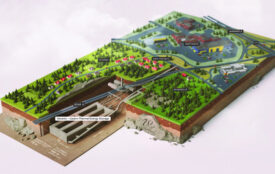A Network for Healthier Cities
The transport sector is a major contributor to environmental degradation, including air and noise pollution, damage to ecosystems and human health.
To monitor air and noise pollution and generate data that will aid in assessing their health impacts related to it, the new research project Net4Cities will develop research infrastructure in eleven European cities in ten countries. This research and infrastructure will support efforts to implement the Zero Pollution Action Plan as part of the European Green Deal. The project is coordinated by the Research Institute for Sustainability (RIFS) in Potsdam.
Although air pollution from transport, including road transport, shipping, and aviation, has generally decreased in the last decades due to improved fuels and vehicle emission standards, it still represents a significant source of air quality degradation in cities. Indeed, the transport sector is the only sector in which ammonia and greenhouse gas emissions have continued to increase over the last three decades. Environmental noise, and in particular road traffic noise, is a major environmental problem in Europe, where at least 20 % of the population lives in areas where traffic noise levels are harmful to health.
The adverse impacts associated with the transport sector are especially high in densely populated urban areas. To address this, the Net4Cities project will develop real-time maps that visualise and integrate air and noise pollution data from more than 30 road traffic, harbor, and airport monitoring stations across the eleven European cities Antwerp, Barcelona, Berlin, Düsseldorf, Heraklion, Limassol, Oslo, Rotterdam, Southampton, Tbilisi and Zurich.
Will provide both citizens and politicians with relevant information
Many of the pollutants that Net4Cities measures, such as ultrafine particulate matter, ammonia and ozone precursors, are not adequately monitored at present and are therefore a focus of this project. Net4Cities will also incorporate the results of previous and ongoing European and international analyses. The project aims to support evidence-based policy development by generating relevant data that can also be used to improve emissions inventories.
Led by Erika von Schneidemesser from the RIFS in Potsdam, an international team of researchers will provide citizens with a tool that can be used to raise awareness and support decision-making to reduce pollution exposure. Decision-makers and stakeholders will be involved in Net4Cities from the outset, and co-creative and policy support processes will be used across the project to foster maximum buy-in from the target audiences.
Net4Cities outputs can be applied to other cities in Europe
Net4Cities will contribute to the EU Zero Pollution Action Plan by developing methods and infrastructures that are easily scalable and can be deployed across Europe from the local to the regional levels. The project seeks to support the development of guidance that will facilitate the standardisation of monitoring technologies and the design of monitoring networks to address the challenges of noise and air pollution today and in the future.
Net4Cities will pursue its objectives across five measures:
- Net4Cities will work with policy- and decision-makers, citizens’ associations and interested organisations to develop evidence-based, tailored policy solutions for effective plans to reduce air and noise pollution.
- Deliver the next generation of advanced monitoring networks for transport-related air (exhaust and non-exhaust) and noise pollution capable of providing information in real-time to support decision-making, for health studies, and to inform policy.
- Generate data on (emerging) pollutants and noise in cities from contrasting geographical and climatic locations with differing fleet compositions to support source apportionment and modelling applications and the improvement of emissions inventories.
- Consolidate information from analyses in databases at the city and national levels in order to assess traffic emissions and aid in efforts to comply with limit values and reduce adverse health impacts.
- Establish the Net4Cities Studio, including guidance on the analysis of emerging pollutants in order to address future challenges appropriately.








